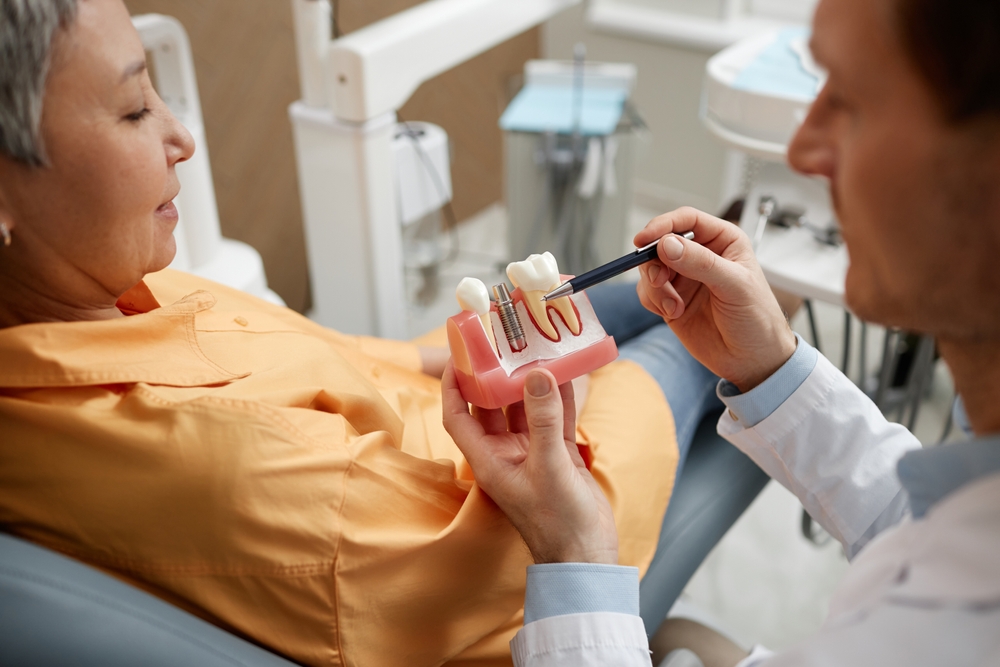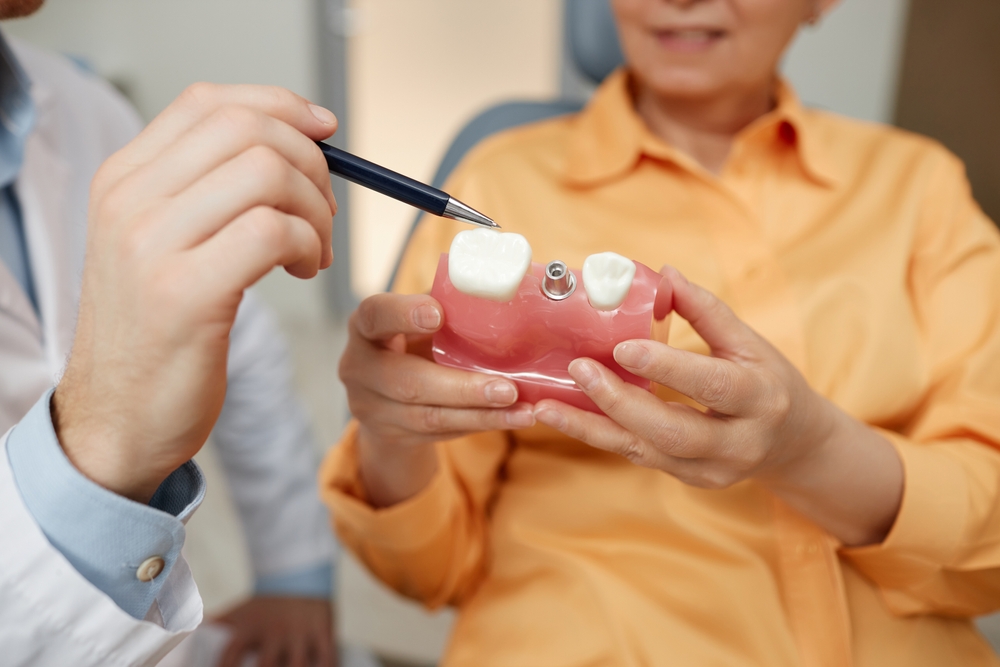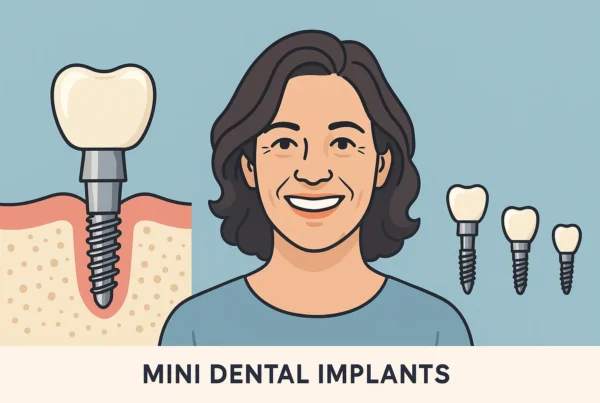Preparing for dental implant surgery can feel overwhelming, especially when living with missing teeth. You might feel embarrassed to smile, hiding your joy behind closed lips. Eating becomes a challenge, with pain making even simple meals difficult.
These issues can affect your job performance and strain your relationships. If you’re tired of these problems and ready for a change, dental implant surgery might be the solution you need.
This guide will help you prepare for the procedure, so you can regain your confidence and enjoy a better quality of life.
Here’s what we’ll cover:
- Understanding the impact of missing teeth on your daily life
- Emotional and psychological effects of living with missing teeth
- Steps to prepare for dental implant surgery
- What to expect during the dental implant procedure
- Post-surgery care and recovery tips
By the end of this article, you’ll have a clear understanding of how to prepare for dental implant surgery. You’ll know what to expect, and how to take the first steps toward restoring your smile and improving your overall well-being.
The Impact of Missing Teeth on Your Daily Life and Well-Being
Living with missing teeth affects more than just your smile. We understand the daily challenges and emotional toll this can take. Here’s how missing teeth impact your life and why finding a solution is important:
- Pain and Embarrassment: Missing teeth can cause sharp pain when eating or talking, make you feel embarrassed to smile or laugh, and lead you to avoid social situations.
- Impact on Eating: Eating becomes difficult with missing teeth, forcing you to stick to softer, less nutritious foods and making it hard to enjoy meals.
- Effects on Job and Relationships: Missing teeth can make you hesitant to speak up at work, cause you to avoid social gatherings, and strain your personal relationships.
- Emotional and Psychological Toll: The ongoing pain and embarrassment can make you feel less worthy or attractive, increase stress, anxiety, and depression, and lead to low self-esteem and social withdrawal.
Understanding these impacts shows why finding a solution is crucial. Dental implant surgery can help you regain your confidence and improve your quality of life. In the following sections, we’ll guide you through the steps to prepare for this life-changing procedure.
Preparing for Dental Implant Surgery
Preparing for dental implant surgery can feel overwhelming. Knowing what to expect and how to get ready can make the process smoother and less stressful. This guide will walk you through the essential steps to ensure you are fully prepared for your dental implant procedure, helping to ensure a successful outcome and smooth recovery.
Step #1, Consultation
The first step in preparing for dental implant surgery is meeting with your dentist. During this visit, your dentist will:
- Check your overall oral health.
- Take X-rays and impressions of your mouth.
- Discuss your dental history and any health conditions.
- Learn about your goals and expectations.
- Explain the procedure and answer any questions you have.
This consultation helps your dentist decide if dental implants, like all-on-4 implants are right for you. Sometimes, you might need preliminary treatments like tooth extractions or bone grafts to get ready for implants. These steps ensure that your mouth is in the best shape for the surgery.
Understanding the Dental Implant Procedure
It’s important to know what will happen during the dental implant surgery. Understanding the process helps you feel prepared and less anxious. Here’s what to expect:
- Implant Placement: The dentist makes a small cut in your gums to place the titanium implant post into your jawbone.
- Healing Period: The implant needs time to fuse with your jawbone. This process, called osseointegration, typically takes 10-16 weeks.
- Abutment and Crown Placement: After the implant fuses with the bone, an abutment is attached to the post, and a custom-made crown is placed on top. If a full set of teeth are to be connected to dental implants, they can be usually placed within 24 hours of the implant surgery.
Knowing these steps helps you understand what the surgery involves and what the timeline looks like. This way, you can set realistic expectations for your recovery and results.
Pre-Surgery Tips
Preparing well for your surgery day can make things go smoothly. Here are some simple tips:
- Follow Fasting Instructions: If you will be under sedation anesthesia, don’t eat or drink anything for the time period your dentist advises.
- Adjust Medications: Your dentist may tell you to stop certain medications before surgery.
- Quit Smoking: If you smoke, try to stop 2 weeks before your surgery to help with healing.
- Arrange Transportation: If you are sedated with pills or with an IV, have someone drive you home after the surgery.
- Plan for Recovery: Stock up on soft foods like yogurt and mashed potatoes. Set up a comfy spot at home with pillows and any medicines you might need.
Taking these steps to prepare for dental implant surgery can help ensure a successful procedure and smooth recovery. With the right preparation, you’ll be on your way to restoring your smile and improving your quality of life.
Post-Surgery Care
Proper post-surgery care is crucial for the success of your dental implants. Knowing what to expect during recovery and how to care for your implants will help ensure a smooth healing process and long-lasting results.
Here’s what you need to know to take care of yourself and your new implants after the procedure.
Recovery Process
After your dental implant surgery, it’s important to know what to expect during the recovery period. This will help you manage your healing process effectively.
- First 24-48 Hours: You might experience some swelling, bruising, and minor bleeding. These symptoms are normal. Use ice packs on your face to reduce swelling and take any prescribed medications as directed.
- First Week: During the first week, focus on rest and gentle oral care. Avoid strenuous activities and eat soft foods. Continue using ice packs if needed and follow your dentist’s instructions for any mouth rinses or medications.
- First Month: By the end of the first week, most if not all of the swelling and discomfort should subside with routine healing. Your dentist will likely schedule a follow-up appointment to check the implant site and ensure proper healing.
- 10-16 Weeks: The implant will need time to fuse with the jawbone in a process called osseointegration. This typically takes 3 to 6 months. During this time, continue following your dentist’s care instructions and attend all follow-up appointments.
Knowing this timeline helps you understand that while the initial recovery is quick, full healing takes several months.
Caring for Implants
Taking good care of your dental implants is crucial for long-term success. Here are some essential tips:
- Maintain Oral Hygiene: Brush your teeth at least twice a day and floss daily. Be gentle around the implant site initially, but keep the area clean to prevent infection.
- Use Antimicrobial Rinses: Your dentist may recommend an antimicrobial mouth rinse to reduce bacteria and promote healing. Follow their advice on how often to use it.
- Avoid Hard and Sticky Foods: During the initial healing period, avoid foods that could damage your implant or cause discomfort. Stick to soft foods and gradually re-introduce harder foods as you heal.
- Quit Smoking: If you smoke, quitting can significantly improve your healing process and the success of your implant. Smoking can interfere with bone integration and increase the risk of complications short and long-term.
- Attend Follow-Up Appointments: Regular check-ups with your dentist are vital. These visits allow your dentist to monitor the implant’s integration with the jawbone and address any issues promptly.
Following these care tips and your dentist’s post-surgery instructions will help ensure your dental implants heal properly and last for many years.
Dreaming of a Confident Smile? Start Your Journey Today with Dr. Elaine Wu
At ReNEW Dental in Tewksbury, MA, Dr. Elaine Wu understands the profound impact of a healthy, complete smile on your overall well-being.
Finding a dentist who genuinely cares about your needs can be challenging. You deserve more than just routine care; you deserve a dentist who listens and tailors treatments to your unique situation.
Living with missing teeth can be daunting, but you don’t have to face it alone. Dr. Elaine Wu and her team prioritize your comfort and confidence every step of the way, ensuring you feel seen, heard, and cared for.
Here’s how they do it differently:
- Personalized Consultations: Dr. Wu takes the time to understand your specific needs and goals.
- Clear Explanations: She ensures you fully understand all treatment options and procedures.
- Comfort and Care: The focus is on making your experience as comfortable and stress-free as possible.
Don’t let missing teeth hold you back any longer. Schedule a consultation today with Dr. Elaine Wu and take the first step towards a confident, radiant smile! Call us today at 978-451-1500.
Schedule a consultation today
Contact Us
Phone:
978-451-1500
Address:
1201 Main St.
Tewksbury, MA 01876
Email:
team@mybrandnewsmile.com






